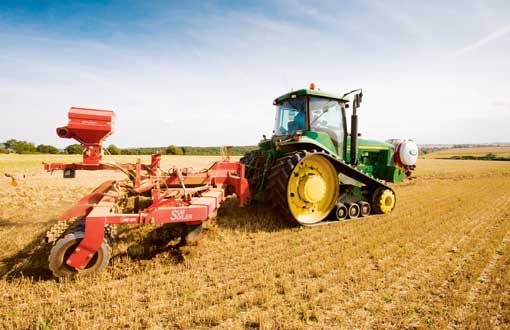Wide range of conditions for autumn operations for Barometer farmers

SOUTH
 Unusually dry conditions have made cultivations so difficult for Andrew Pendry that he suspended work on his Isle of Sheppey land – it had only 6mm of rain in September.
Unusually dry conditions have made cultivations so difficult for Andrew Pendry that he suspended work on his Isle of Sheppey land – it had only 6mm of rain in September.
“It’s been incredibly dry and we’ve been burning a lot of diesel. We’ve had to go through with the Sumo on some former EAS grassland just to get the plough into the ground. But it’s been physically impossible to get a seed-bed – so we stopped drilling wheat after 135ha. There’s no point in spending any more money until we get some rain.”
Fortunately his newly acquired land near Tunbridge Wells received 31mm over the same period, and all 213ha was sown to Claire.
“What’s come up looks very good, but there are parts of fields where it isn’t even through yet. The oilseed rape off the island also looks good, but here [on Sheppey] it’s only at the one-leaf stage and not responding to autumn nitrogen.”
SOUTH-WEST
 For Steve Lee the Devon autumn has become intensely frustrating. “We’ve had a shed load of rain and it’s been seriously wet down here.”
For Steve Lee the Devon autumn has become intensely frustrating. “We’ve had a shed load of rain and it’s been seriously wet down here.”
Combining was still under way last week; just 31ha of wheat was drilled, and only half his planned 85ha of oilseed rape was in the ground, having been sown only a week earlier. “We weren’t able to roll and made quite a mess applying the pre-emergence.”
Mr Lee likes to finish sowing wheat, apart from that after grain maize, by the end of the first week in October. “But there’s no chance of that unless there’s a dramatic change in the weather.
“We’ve got a lot of ground min-tilled and ready to sow with the Horsch, but we might have to power-harrow and drill, which will mean more expense.”
Lack of earlier sunshine means the grain maize harvest will be late, he added. “So I’m concerned for the following wheat. Altogether it’s been a bit of a nightmare year.”
His main consolation was that harvest yields and quality were generally good. Lear, which will again be his number one wheat choice, performed very well. “It did 10t/ha after maize.”
EAST
 For Edd Banks in Cambridgeshire conditions have been near perfect. “I’m really more than happy. We’ve had just enough rain for the seed-beds and the oilseed rape is flying along.”
For Edd Banks in Cambridgeshire conditions have been near perfect. “I’m really more than happy. We’ve had just enough rain for the seed-beds and the oilseed rape is flying along.”
Castille has been dropped, leaving mainly Sesame and Cabernet.
He believes the crop’s progress is partly down to band-fertilising at drilling for the first time, and through modification the KRM equipment has been given an extra autumn task.
Two days in the workshop saw the machine fitted to a set of rolls to act as an Avadex (tri-allate) granule spreader. “It has worked superbly and means we can get the application timing spot-on. Previously we’ve sometimes had to wait for the contractor.”
The other main change has been to introduce a Carrier light cultivator to follow the TopDown instead of making two passes with the latter. “We wanted to avoid over-working the soil,” explains Mr Banks.
Wheat sowing – with the mainstay remaining Alchemy – began on 13 September. “If anything, we’re tending to drill later because of blackgrass. But this year we’ve had brilliant blackgrass germination and sprayed off a lot pre-drilling.”
HUMBERSIDE
 Consciously conserving what little moisture his Lincolnshire land received this autumn has paid dividends, Jonathan Fenwick believes.
Consciously conserving what little moisture his Lincolnshire land received this autumn has paid dividends, Jonathan Fenwick believes.
“We’ve rolled everything. People say there’s little point rolling after the Vaderstad drill, but we nearly always do and I believe it’s £5/acre well spent. All our early-sown wheat and the rape are up and we’ve had very little slug trouble. Pre-emergences also work better after rolling.”
By now [Oct 7] his 1,620ha sowing programme should be complete. “It’s been foot on the pedal all the way. We’ve been frustrated by quite a few breakdowns in the dry conditions, but our two mechanics have worked hard to keep us going.”
Key machinery has included a Rexius Twin cultivator, particularly useful for firming blowing sand after ploughing, says Mr Fenwick.
Cereal drilling, starting in the first week of September, was driven solely by the challenge of getting 1,200ha sown on time, rather than any concern for recent spring droughts. His main variety change has been to drop Oakley wheat and bring in Santiago.
WEST
 Despite having some of his land “like concrete”, Peter Sands is content with autumn progress and hoped to complete drilling in Staffordshire this week. “Normally we don’t finish until the end of October,” he says. “But we haven’t had to stop for the weather, so I’m very happy.”
Despite having some of his land “like concrete”, Peter Sands is content with autumn progress and hoped to complete drilling in Staffordshire this week. “Normally we don’t finish until the end of October,” he says. “But we haven’t had to stop for the weather, so I’m very happy.”
Cultivations have remained largely unchanged, although the dry soil has made ploughing – the norm ahead of barley and oats for about one-third of the land – unusually difficult, he says.
“The rain we have had has helped the rape and wheat to germinate, but it’s only got into the top inch or so.”
The hard ground meant his revived sub-soiling operations had to be abandoned after about 200ha. “We hadn’t done any for about 20 years, but after some test digs and a lot of people round here swearing that sub-soiling increases their yields, we decided to give it a go and bought a 4m nine-leg Opico machine. But we were getting through a set of points every day. They cost £50 each, so we gave up.”
Sowing of oilseed rape – all Cubic again – went well, so cereal drilling began about a week earlier than last year.
NORTH
 The recent Indian summer came a month too late for David Hall in Northumberland.
The recent Indian summer came a month too late for David Hall in Northumberland.
With combining not over until 24 September and only about half his intended wheat – all Claire for its earliness – sown by the end of last week, his rain-affected autumn programme was well behind where he would like it to be.
“Rain stopped us combining on 2 September, and we then had only three days cutting in three weeks. The pressure is on a bit,” he admits. “It was a desperate summer – wet right through from May.”
Drilling had been possible only on the lightest land. “The rest is ploughed, but we’re having to wait for it to dry out.”
His main concern was for the 100ha of oilseed rape, all “easier-to-combine” Catana after Excalibur was dropped. “It has been in a month and is only at the one-leaf stage. It’s just not been growing. The trouble is that the soils are cold because it’s been so wet.”
He still hopes to have all the winter barley drilled by his cut-off date of 10 October. Beyond then he will switch to spring varieties.
SCOTLAND
 After a sodden summer in Aberdeenshire, which left some of Stuart Davidson’s spring oats still uncut last week, a local machinery ring has helped put his autumn programme back on track.
After a sodden summer in Aberdeenshire, which left some of Stuart Davidson’s spring oats still uncut last week, a local machinery ring has helped put his autumn programme back on track.
At one stage in mid-September he despaired of getting any more than 100ha of winter barley, his only autumn cereal, drilled after torrential rain brought drilling to a halt for at least a week.
Fortunately all his 323ha of oilseed rape – mainly Cracker to counter club root, plus Temple – was sown by 31 August.
“I lay in bed on the Sunday wondering how we were going to manage.”
A call to Ringlink the next day brought in two extra five-furrow ploughs, with drivers, to add to the farm’s two similar machines. “A one-pass drill also arrived, and the following day another three came.
“In the end we had 50 furrows turning over 20m at a time with the following drills sowing 18m. They got 400ha in by last Friday [30 Sept] so we won’t need any spring sowings.
“I don’t regret the decision. I calculate that the potential extra value of having the crop sown on time is £40,000 at today’s prices.”
NORTHERN IRELAND
 Recent rain in Northern Ireland has had both positive and negative impact on Martin Hamilton’s operations.
Recent rain in Northern Ireland has had both positive and negative impact on Martin Hamilton’s operations.
On the plus side, the damp soil helped reduce tuber bruising during potato lifting, which began about a week earlier than usual on 18 September, reports manager Gary Adams. On the other hand, the last 12ha of cereal straw had to be turned three times before it could be baled.
“We’re into the last 61ha (150 acres) of 147ha (360 acres) of potatoes, and the yields have been outstanding. We’ve been getting 20+t/acre of Maris Piper instead of our more usual 16-17t. We already have 2,000t in cold store.” Tuber quality is “absolutely superb”, adds Mr Hamilton.
“The flip side of the coin was the straw,” says Mr Adams.
For more on our Barometer farmers, visit our dedicated web page.
